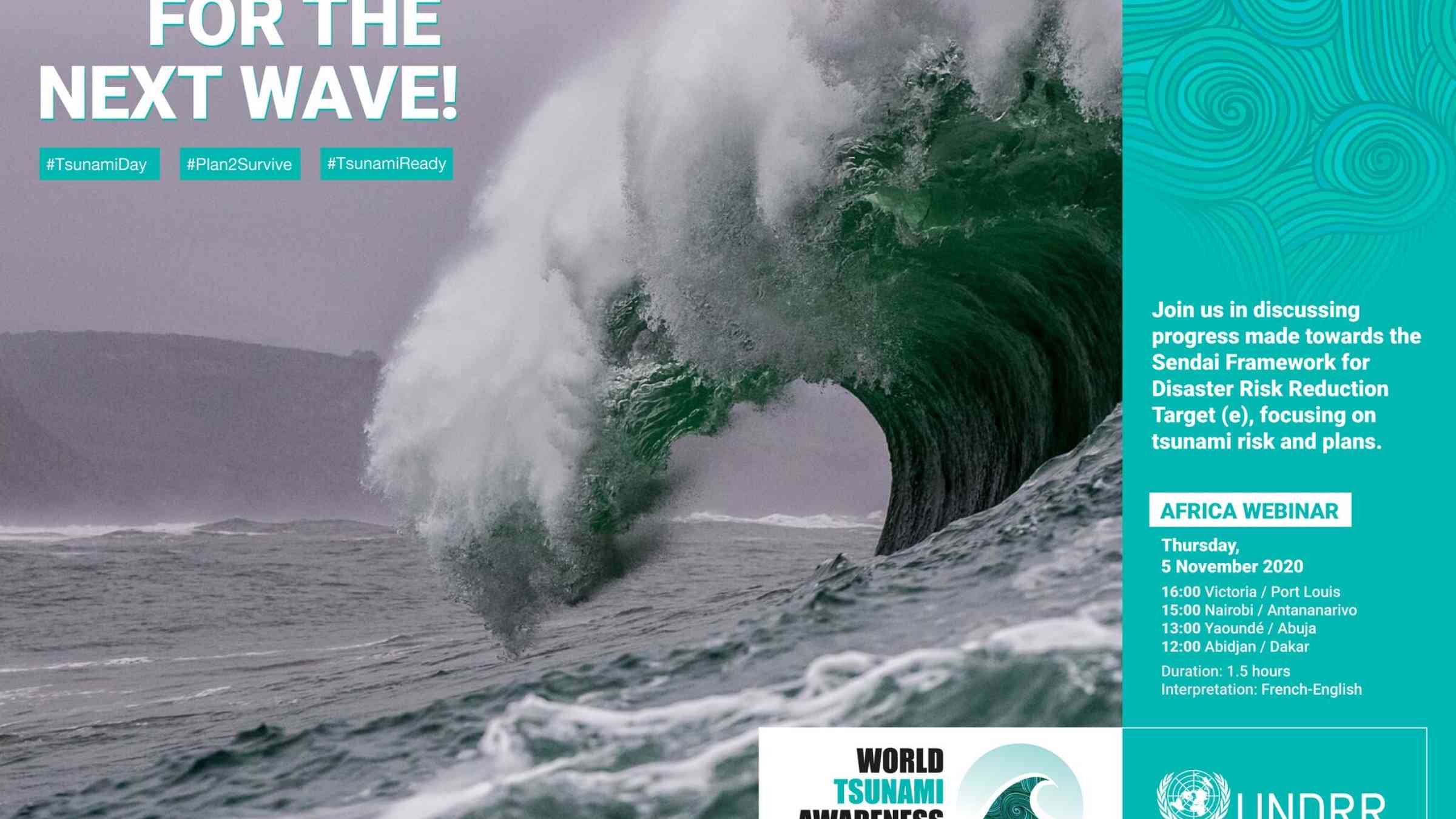World Tsunami Awareness Day- Africa Webinar

Thursday, 5 November 2020
16:00 Victoria / Port Louis | 15:00 Nairobi / Antananarivo | 13:00 Yaoundé / Abuja | 12:00 Abidjan / Dakar |
Duration: 1.5 hours / Interpretation: French-English
Register here: https://undrr.zoom.us/webinar/register/WN_cK5ILAo9RbKMT1mYdjay2A
BACKGROUND
Tsunamis are, thankfully, rare events, but they do happen. They are often more sudden and deadly than any other hazard, claiming thousands of lives and causing massive economic loss in just a few minutes, with long lasting negative effects on people’s lives and livelihoods. Countries around the world have learned valuable lessons from first-hand experience of tsunami and have worked tirelessly to create a culture of tsunami awareness among the general public, educating coastal communities at risk and ensuring that people recognize the warning signs so that they take prompt action to evacuate to a safe place.
It is particularly encouraging to see the progress being made in the Caribbean; more than 26 communities across 15 countries are now recognized as ‘Tsunami Ready’[1]. The Sendai Framework for Disaster Risk Reduction, the global plan to reduce disaster losses by 2030, calls for a substantial increase in the number of national and local disaster risk reduction strategies in place by the end of 2020 (Target (e)), and urges all countries to have multi-hazard early warning systems in place by 2030 (Target (g)). Today, 93 countries report having national disaster risk reduction strategies in place and 69 have access to multi-hazard early warning systems.
This is a good start, but it is not enough if we want to meet the Sendai Framework deadline for Targets (e) and (g). To celebrate the fourth World Tsunami Awareness Day (WTAD) on 5 November 2020, country representatives will be invited to discuss how they are implementing Target (e) of the Sendai Framework, focusing on related tsunami plans and strategies.
ABOUT THE WEBINAR
On 5 November 2020, UNDRR-Africa will invite country and regional representatives, UN and other International Organizations based in Africa to a 1.5 hour panel discussion to share with a virtual audience how they are implementing disaster risk reduction strategies and are preparing to face the next tsunami.
Participants will reflect on two main components: (1) the importance of reducing tsunami risk through further developing accurate and timely tsunami warning systems, risk assessments and information and (2) strengthening disaster risk governance to reduce existing disaster risks and avoid creating new risks.
OBJECTIVE:
To communicate progress made in Sendai Framework Target (e) and provide an opportunity for representatives to explain how they are implementing disaster risk reduction strategies and are preparing to face the next tsunami.
PARTICIPANTS:
Moderator: Diana Mosquera Calle (Programme Management Officer, UNDRR)
Remarks:
- Amjad Abbashar (Chief, UNDRR Regional Office for Africa)
- Mika Odido (Intergovernmental Oceanographic Commission Coordinator in Africa, UNESCO)
Panellists:
- Gina Bonne, Indian Ocean Commission,
- Ranoeliarivao Sitraka, National Office for Risk and Disaster Management (BNGRC), Madagascar
- Vicky Berlouis, Department of Risk and Disaster Management, Seychelles
- Eric Sam-Vah, Deputy Head of Delegation, Indian Ocean Regional Intervention Platform (PIROI)
- Dr. Agnes Kijazi, Director General, United Republic of Tanzania Meteorological Agency
- Marzia Santini, European Commission Joint Research Centre
|
Time |
Topic and speaker |
Segment focus |
|
15:00 – 15:05 |
Opening remarks Diana Mosquera Calle, UNDRR
|
|
|
15:05 – 15:10 |
Remarks Amjad Abbashar, UNDRR |
Current Progress on Sendai Target (e) and the importance of disaster risk governance in Africa |
|
15:10 – 15:15 |
Remarks Mika Odido, UNESCO |
UNESCO’s activities in preparing to reduce tsunami risk in line with the Sendai Framework |
|
Time |
Topic and speaker |
Segment focus |
|
PANEL DIALOGUE: Each panellist to individually present and then participate in a discussion facilitated by the Moderator |
||
|
15:15-16:15
|
Presentation
- facilitated by the Moderator |
We encourage a 10 minute contribution from each panel member that reflects (1) the importance of reducing tsunami risk through further developing accurate and timely tsunami warning systems, risk assessments and information and (2) strengthening disaster risk governance to reduce existing disaster risks and avoid creating new risks. Panel members are welcome to speak with or without an accompanying PowerPoint. |
|
16:15-16:30 |
Closing remarks
|
Closing remarks highlighting Africa’s disaster risk reduction approach |
[1] In 2015, the UNESCO IOC Intergovernmental Coordination Group for Tsunamis and other Coastal Hazards for the Caribbean and Adjacent regions (ICG/CARIBE EWS-X) recommended the approval of the Tsunami Ready guidelines, and this recommendation was approved by the IOC General Assembly. Subsequently, the IOC global TOWS Working Group IX (2016) noted the ICG/CARIBE-EWS adoption of the Tsunami Ready guidelines.